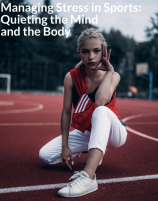Keep Your Mental Health in the Game: Therapy and Support for Athletes
Keep Your Mental Health in the Game: Therapy and Support for Athletes

Athletes report depression and anxiety at roughly the same rates as the general population but many of them still hesitate to open up publicly about mental health struggles. While several influential athletes have recently shared their stories and given the world of sports a new take on the expression “get your head in the game,” the majority of them aren’t making headlines.
At ADAA we don’t believe anyone should have to go public with their story, athlete or not, if they don’t want to, but as a mental health organization we want to ensure that people get the help and resources they need when it comes to depression, anxiety and other co-occurring disorders. For athletes, this could mean more focused help from a specialized therapist or support group.
For over 20 years, ADAA member Mitchell Greene, PhD, has worked with athletes of all ages. Owner and director of Greenepsych, a private clinical and sports psychology practice in the suburbs of Philadelphia, Dr. Greene helps patients with both clinical issues and performance and sports-related challenges. He sees athletes “up and down the competition ladder” from junior-level youths to high school kids, to college students and up through the professional and Olympic ranks. If needed or requested, he works with athletes’ parents, caregivers, family members, and even coaches, trainers and athletic directors.
Sports Culture and Psychology
According to Dr. Greene, working with an athlete in therapy requires cultural competence and understanding of the sports psyche. Most of us watch or participate in sports on some level but professional athletes experience a culture that has “its own rules, tempo and challenges.”
“Someone working in this field would benefit from understanding the world of athletes, their lives, their training, the pressure and stress they come under from coaches, fellow athletes, parents and even themselves,” Dr. Greene told ADAA.
He said the work he does with athletes, and especially high-performing athletes, focuses on specific outcomes and immediate feedback. It requires both very short-term and longer-term objectives.
“For example, if they come to you on a Tuesday and their big game is on Saturday,” Dr. Greene explained, “they are going to measure success or failure depending on whether they win or lose that game. The competition and pressure they feel is intense – it’s anxiety provoking - and they’re aware that anything can make or break their career.”
Like any good therapist, Dr. Greene helps piece together each athlete’s narrative – where did the mental health concern start, what is the timeline, was there a triggering event or where might the stress be coming from, and what have they tried already to manage any depression or anxiety they experience?
“In a clinical situation where an athlete is really struggling, a traditional therapist might say, ‘well if you’re that anxious or depressed, why don’t you quit or take some extended time away?’ And there is certainly a time and place for stepping out of the game,” Dr. Greene explained, but for athletes it tends to be more complicated.
Blindsided by the Grind
Athletes know how to grind, says Dr. Greene. They can grind to greatness in their sport but at times, the constant grinding comes at a cost.
“They know how to get up early and train and stay up late, and they know how to get on a bus or plane and go to a game or match in another city or country, but they don’t always know how to take care of themselves,” Dr. Greene explained.
Taking care of oneself, and particularly one’s mental health, is essential for everyone, athlete or not. But with athletes, Dr. Greene says it isn’t always a top priority, and that can leave them unprepared when setbacks arise. In his practice, Dr. Greene emphasizes learning more about his clients, not just as athletes but as human beings.
“When someone comes through my door wanting to perform better, I want to help them, but I also want to get to know them outside of that. Where else do they find joy? What passions do they have? Who is important to them?”
Athletes, especially when starting out, often put all their energy into their sport, feeling like they don’t have time for anything else. Dr. Greene says it is important for them to make time to do other things they might like or have been wanting to do such as learn a new language, or get into chess, or take an extracurricular class.
“I talk to them about that not because their athletic goals might not work out, which they are well aware of, and that can be a source of anxiety too, but it might even help them in their sport if they aren’t so single minded and mono-focused,” he told ADAA. “They don’t have to give up on their dreams, just that we need to move the knobs and change the dials a bit because at this pace, they will burn out and not be able to get rid of that voice in their head.”
Raising the Bar on Mental Health in Sports
The fact that many athletes are openly sharing their mental health struggles is a great advance, says Dr. Greene, but their stories do not startle him or anyone else who works in his field.
“We’ve known behind the scenes the struggles of the high-performing athletes, partly because we see some of them privately,” Dr. Greene explained. “What differs now is that they are volunteering to speak out about their mental health, yet it still surprises us as a society because we have a hard time believing these strong, talented, disciplined athletes could also have this dark side and that they struggle too.”
Dr. Greene feels the sports world, from athletes to coaches to athletic directors, is more dialed into the importance of mental health now. Athletes will continue to work hard, push themselves, and make their bodies do things many of us can only marvel at, but the attention and awareness to mental health in the field of sports gives them a fighting chance with conditions like anxiety and depression.
“Conversations are being had and discussions about how much is too much are happening,” Dr. Greene said. “Five years ago, the idea of a coach giving an athlete a mental health day would have been laughable, seen as soft, but now it’s a reality and even a necessity.”





















